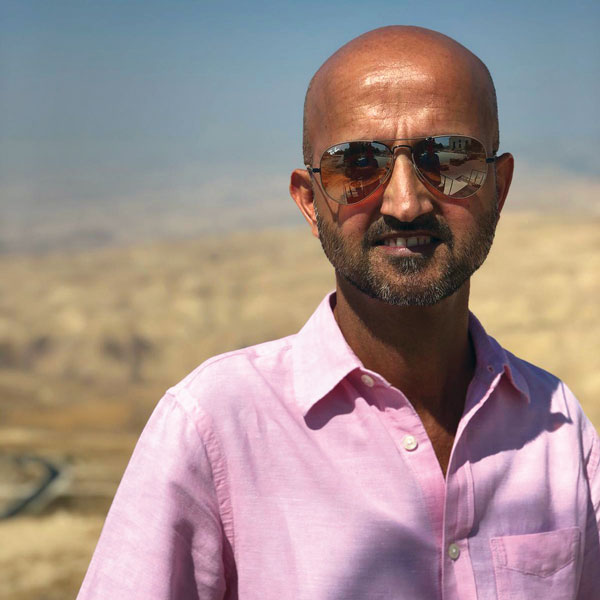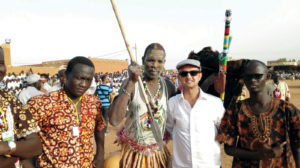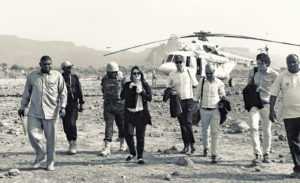
Ishtiaq Ghafoor ’00 finds harmony in his life’s work with the foreign service

The College of Wooster provided Ishtiaq Ghafoor ’00, an international student from Britain, with a foundation in writing and critical thinking that has helped him to listen, analyze, and participate in important peace negotiations.
The philosophy and economics major and French minor took the lessons he learned at Wooster onto the world stage in foreign service and into his current role as the Deputy British Ambassador to Yemen. From the initial first-year writing seminar to the seminal Independent Study, the Wooster experience emphasized for Ghafoor and his peers “how to read, write, speak, act, and be leaders.”
Ghafoor admittedly arrived at Wooster as a reserved, but ambitious British youth. “The liberal arts experience at a small college was possibly one of the best things I could have done at that age,” he said. In the first-year writing seminar, he learned to write, critique, and revise based on how someone with an opposing view might think about the topic. His I.S., which focused on international development, allowed him to “be independent and think freely without being circumscribed by high ideologies and prevailing orthodoxies”—all skills that he eventually would use in peace negotiations and other high-level embassy responsibilities.
If he had attended a university in the United Kingdom, he would have studied math and not had the opportunity to explore other subject areas. He credits Garrett Thomson, the Elias Compton Professor of Philosophy, and David Wilkin, professor emeritus of French and Francophone studies, with igniting his passion for philosophy and French. They have remained mentors and good friends on his path which started in journalism to an international career.
After he served as editor of The Wooster Voice, chief editor of a student-focused magazine that was part of a class and an intern at Simon and Schuster in New York City, Ghafoor sought a career in journalism. In his first post-college job, he wrote about national science and health issues for a specialized newspaper in Washington, D.C.
He returned to the United Kingdom a year later and worked for Reuters in Edinburgh as a financial journalist, a step closer to his economics degree. Two years later, he applied for and received an economic advisor position in the U.K. government.
Because of his acumen with political analysis, external engagement, and the ability to learn languages, Ghafoor moved easily through the levels of governmental and diplomatic hierarchy. He passed the Foreign Service exam and was admitted to the British Diplomatic Service in 2010 after training as a U.K. official in Strasbourg, France, at L’Ecole National d’Administration. As part of the training program, he interned with the European Commission working on European affairs and then with the French Regional Government. “I really enjoyed that and thrived in that environment. I started thinking that I would rather be in foreign affairs than in economic policy,” he said. For 12 years he has been a diplomat and served in Qatar and Sudan prior to his current post with the British Embassy to Yemen.

In Sudan, Ghafoor (second from left) attends the Nuba Mountains Cultural Heritage Festival marking the International Day of the World’s Indigenous Peoples.
Ghafoor has been very close to the peace processes in Sudan and Yemen. “I was trying to bring peace between the government and rebel groups in Sudan. I worked directly with the African Union mediators, encouraging both delegations, listening to them, and coming up with formulas that could satisfy both sides to try to reach a peace agreement,” he said.
The experience he gained in Sudan now helps him with his work in Yemen as he supports the United Nations in seeking peace. “There are always ups and downs; it’s never straightforward and is incredibly complicated. But that is my niche.” He’s most proud of his involvement in negotiations that resulted in the Yemen government and the rebels signing the Stockholm Agreement in 2018. The agreement averted a catastrophic military escalation at the time.
“The Stockholm Agreement was front-page news in the New York Times and certainly a moment to celebrate,” he said. “I, along with colleagues from other big nations—France, China, Russia, and the U.S.—were there when the talks were happening. We were supporting the talks to be a success, cajoling both sides, coaxing them, and offering them incentives to cooperate. At times, we warned them if they rejected a peace agreement there might be repercussions on the world stage.”
The agreement has not delivered the sustainable peace that leaders had hoped for; however, for Ghafoor, “That is how it works. You try to move things forward in a modest, humble way. You recognize your contributions and realize you have a lot of responsibility. Most of all, you try to use your influence to make the world a better place. And sometimes it works.”
But sometimes it doesn’t, Ghafoor pointed out. There is a “perceived influence of diplomats in the changing world. It may be less of an issue for diplomats from middle-ranking nations, but for those of us from the bigger nations, it’s a bit of cold water on your head when you realize how little actual influence you have,” he said.

Ghafoor leads a delegation to Darfur, a region in western Sudan, for peace talks with local tribes. Photo: UNAMID
“Diplomacy is being massively impacted by the fact that the world is moving at a faster pace than we can operate,” he said. For example, the Yemen conflict continues. There may be an organized attack by the Houthi rebels on the Saudi Arabian territory. “In the morning, the details are already reported by the news media, so by the time we at the embassy are done analyzing it and getting ready to send a cable to London, our bosses are already informed. The question becomes, ‘What can I provide that goes beyond the news reports?’ This is where diplomacy is changing,” he said.
Diplomats are being pushed to show the value-added of being on the ground and using contacts with good and bad people to share motivations that journalists might not have access to. According to Ghafoor, not everyone is rising to that challenge to provide a deeper level of analysis. The other challenge is a personal one: maintaining a happy family through the course of an unpredictable and globally mobile career. It is difficult for partners of diplomats to continue working, and children must cope with switching schools frequently. Ghafoor and his wife, Tamara, met and married in Jordan and will move together to Indonesia next.
Even in the changing times, he sees the charms of working in the Foreign Service, and he’s grateful for the experiences he had at Wooster that helped him get there. “It’s a career, a vocation, a life’s work. It provides a structure that allows me to grow professionally and see the different possibilities.”
This feature originally appeared in the spring 2023 edition of Wooster magazine.
Posted in Alumni, Magazine on March 27, 2023.
Related Posts
Related Areas of Study
Global & International Studies
Learn about global challenges and issues using methods in economics, history, and political science coupled with language immersion and study abroad
MajorGlobal Impacts
Turn an interest in international service, economic development, NGOs and INGOs into a career
PathwayFrench & Francophone Studies
French language, literature and culture with study abroad and outside-the-classroom immersion opportunites
Major Minor

